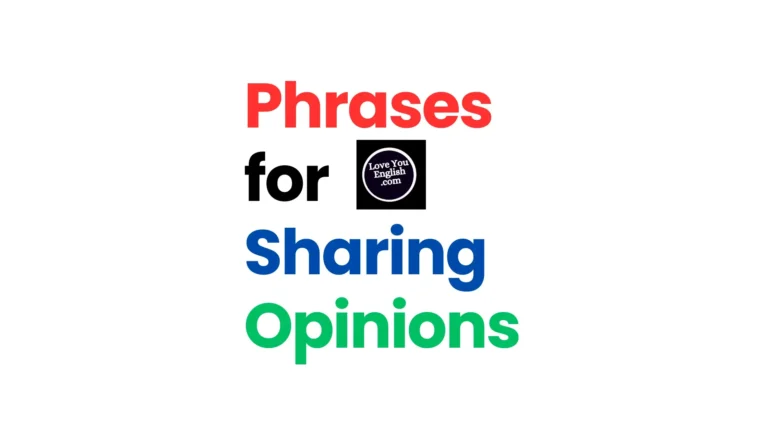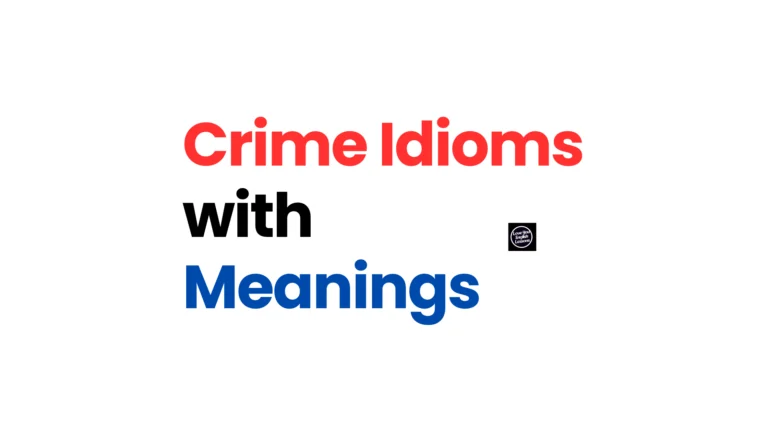30 popular English idioms in English
Hello everyone,
Have you ever heard someone say, “It’s raining cats and dogs,” and wondered why they’re not talking about actual pets falling from the sky?
Or maybe you’ve been told to “break a leg” before a performance and thought, “That doesn’t sound very encouraging!”
Welcome to the world of idioms—those quirky, colorful phrases that make the English language so interesting.
An idiom is a group of words that, when put together, has a meaning different from what you’d expect if you looked up each word separately.
They’re like secret codes that native speakers use all the time, often without even realizing it.
Learning these idioms can really help you understand and speak English better, making you sound more natural and fluent.
In this lesson, we’ll explore 30 popular English idioms.
I’ll explain what they mean, where they come from (when we know), and how to use them in everyday conversations. Let’s dive in!
1. It’s Raining Cats and Dogs
Meaning: It’s raining very heavily.
Example: “Don’t forget your umbrella—it’s raining cats and dogs out there!”
Origin: Nobody’s sure, but some think it’s because, in old Norse mythology, Odin (the god of storms) was often shown with dogs and wolves, symbols of the wind. Witches, who were said to ride through the sky during storms, were often pictured with black cats.
2. Break a Leg
Meaning: Good luck! (Often said to actors before they go on stage.)
Example: “Your audition is in 5 minutes. Break a leg!”
Origin: This one’s a bit of a mystery, but one theory is that it comes from the idea of bowing or curtsying after a great performance—you might “break” (bend) your leg while doing so.
3. Piece of Cake
Meaning: Something that’s very easy to do.
Example: “That math test? It was a piece of cake!”
Origin: This phrase became popular in the 1930s, when cakes were often given as prizes for easy competitions.
4. Hit the Hay / Hit the Sack
Meaning: Go to bed, go to sleep.
Example: “It’s midnight, and I have work tomorrow. Time to hit the hay!”
Origin: Long ago, mattresses were often made of hay (dry grass) or stuffed with hay. A sack filled with hay or straw was also a common makeshift bed.
5. Spill the Beans
Meaning: To reveal a secret, often by accident.
Example: “I wasn’t supposed to tell anyone about the surprise party, but I spilled the beans to Mom.”
Origin: In ancient Greece, people used beans to vote in elections. Spilling the beans meant revealing the results before they were officially announced.
6. To Cost an Arm and a Leg
Meaning: To be very expensive.
Example: “I’d love to buy that new smartphone, but it costs an arm and a leg!”
Origin: This phrase became popular after World War II, referring to the high price that soldiers paid (their arms and legs) during the war.
7. Barking Up the Wrong Tree
Meaning: Looking in the wrong place, accusing the wrong person, or trying to do something the wrong way.
Example: “If you think John took your book, you’re barking up the wrong tree. He wasn’t even at school yesterday.”
Origin: From hunting, where dogs would sometimes bark at a tree where they thought an animal was hiding, but the animal was actually somewhere else.
8. The Ball is in Your Court
Meaning: It’s your turn to make a decision or take action.
Example: “I’ve made my offer. Now the ball is in your court—you can accept it or make a counter-offer.”
Origin: From tennis or similar sports, where players hit the ball back and forth over a net. When the ball is on your side, it’s your turn to hit it back.
9. To Kill Two Birds with One Stone
Meaning: To solve two problems with one action.
Example: “By working part-time at the bookstore, Sarah kills two birds with one stone—she earns money and gets a discount on books for college.”
Origin: A very old saying, referring to the idea of being so skilled with a slingshot that you could hit two birds with a single stone.
10. To Cut Corners
Meaning: To do something in a quick, cheap, or careless way.
Example: “The builders cut corners when making the house, and now we’re having all sorts of problems.”
Origin: In racing (like car racing), taking the inside of a corner is a shorter route but can be dangerous if not done properly.
11. The Last Straw
Meaning: The final small problem that makes a situation unbearable.
Example: “I was already having a bad day, but getting a parking ticket was the last straw—I just broke down and cried.”
Origin: From the saying “the straw that broke the camel’s back.” The idea is that while a camel can carry a lot of straw, just one more piece might be too much.
12. A Penny for Your Thoughts
Meaning: A way to ask what someone is thinking about, especially when they seem deep in thought.
Example: “You’ve been staring out the window for an hour. A penny for your thoughts?”
Origin: This phrase has been around since at least 1535, possibly because a penny was once seen as a decent amount to pay for someone’s opinion.
13. To Beat Around the Bush
Meaning: To avoid getting to the main point, often because it’s uncomfortable.
Example: “Stop beating around the bush and just tell me—did you break my vase?”
Origin: From hunting, where people would beat the bushes to scare birds or other animals out into the open.
14. To Bite Off More Than You Can Chew
Meaning: To take on more than you can handle.
Example: “Tom signed up for six classes this semester. I think he’s bitten off more than he can chew.”
Origin: A literal reference to taking a bite of food that’s too big to chew comfortably.
15. To Hit the Books
Meaning: To study hard, especially for a test.
Example: “No video games this weekend—I need to hit the books for my history exam.”
Origin: Simply refers to the physical act of opening books to study.
16. To Let the Cat Out of the Bag
Meaning: To reveal a secret accidentally.
Example: “I was planning a surprise birthday party, but Mom let the cat out of the bag by asking my friend about cake flavors.”
Origin: Long ago, dishonest traders would sometimes try to sell a cat instead of a piglet at market. If someone looked in the bag and saw the cat, the trick was revealed.
17. To Pull Someone’s Leg
Meaning: To tease someone or play a joke on them.
Example: “Don’t worry, I’m not really moving to Antarctica—I was just pulling your leg!”
Origin: In the 18th century, thieves would trip people (pull their leg) so their partners could rob them more easily.
18. The Cold Shoulder
Meaning: To ignore someone deliberately, to be unfriendly.
Example: “I said hello to Jake, but he just gave me the cold shoulder.”
Origin: Surprisingly, this once meant the opposite! In medieval England, giving a guest a cold piece of meat (a cold shoulder) was a way to make them feel welcome.
19. To Burn the Midnight Oil
Meaning: To stay up late working or studying.
Example: “If I want to finish this project on time, I’ll have to burn the midnight oil all week.”
Origin: Before electricity, people used oil lamps. Burning oil late into the night meant you were working long hours.
20. To Paint the Town Red
Meaning: To go out and have a really good, lively time.
Example: “It’s Sarah’s 21st birthday—we’re going to paint the town red!”
Origin: This might come from a night in 1837 when a group of men in England got drunk and literally painted parts of their town red.
21. To Keep Someone on Their Toes
Meaning: To keep someone alert and ready for anything.
Example: “Our new boss keeps us on our toes with surprise meetings.”
Origin: From ballet, where dancers literally stay on their toes, needing to be alert and ready to move at any moment.
22. To Be Over the Moon
Meaning: To be extremely happy or delighted.
Example: “When Emma got accepted to her dream college, she was over the moon!”
Origin: The idea that extreme happiness would lift you higher than just “jumping for joy”—you’d go all the way over the moon.
23. A Blessing in Disguise
Meaning: Something that seems bad at first but turns out to be good.
Example: “Losing my job felt terrible, but it was a blessing in disguise—it pushed me to start my own business.”
Origin: The idea comes from the fact that blessings (good things) don’t always appear good at first.
24. To Get Cold Feet
Meaning: To become nervous about doing something you had planned.
Example: “I was going to go skydiving, but I got cold feet when I saw how high up we’d be.”
Origin: Some think it’s because your feet can literally feel cold when you’re scared, due to less blood flowing to them.
25. To Be on Cloud Nine
Meaning: To be extremely happy.
Example: “Ever since they got engaged, Kate and Tom have been on cloud nine.”
Origin: In the 1950s, the U.S. Weather Bureau ranked cloud types from one to nine, with nine being the highest and fluffiest—like being on top of the world.
26. To Be a Couch Potato
Meaning: A person who spends a lot of time sitting and watching TV.
Example: “After his retirement, my uncle became a real couch potato—he watches TV all day!”
Origin: In the 1970s, with more people watching lots of TV, “couch” (where you sit) was paired with “potato” (implying someone inactive and lumpy).
27. Out of the Blue
Meaning: Unexpectedly, with no warning.
Example: “Out of the blue, my old friend from high school called me yesterday.”
Origin: If something comes “out of the blue sky,” it appears unexpectedly, like a bolt of lightning on a clear day.
28. To Cut to the Chase
Meaning: To get to the main point quickly.
Example: “I know you’re busy, so let’s cut to the chase—can you work this Saturday?”
Origin: In early films, dramatic scenes would often lead up to an exciting chase scene. “Cutting to the chase” meant skipping the build-up and going straight to the exciting part.
29. To Be All Ears
Meaning: To listen very attentively.
Example: “You said you have big news—I’m all ears!”
Origin: A simple visual image—when you’re really focused on listening, your ears seem to be the only part of you that matters.
30. To Take a Rain Check
Meaning: To politely decline an invitation, but with the suggestion that you’d like to do it another time.
Example: “I’d love to get coffee, but I’m swamped with work. Can I take a rain check?”
Origin: From baseball in the 1880s. If a game was rained out, ticket holders could use their “rain check” to attend a later game.
______________________________________
Idioms might seem strange at first, but they add color, humor, and cultural richness to the language.
They’re like little stories or images that make our conversations more vivid.
Remember, idioms often don’t make literal sense.
You can’t actually “spill beans” to reveal a secret, and if it’s “raining cats and dogs,” no animals are falling from the sky!
The key is to learn the phrase as a whole and understand its figurative meaning.
A fun way to practice is to try using one or two idioms in your conversations each day.
Soon, you’ll be tossing them around like a native speaker.
Just be careful not to overdo it—using too many idioms can make your speech sound unnatural.
And if you’re unsure about an idiom’s meaning or usage, it’s always good to ask a native speaker.
After all, you wouldn’t want to be “barking up the wrong tree”!
So go ahead, dive into the colorful world of English idioms.
They’ll help you express yourself more vividly and understand native speakers better.
Before you know it, you’ll be “hitting the books” (studying hard) and soon, speaking idiomatic English will be “a piece of cake” for you.
Good luck, and “break a leg” in your language learning journey!








 You make my life beautiful. I love you! Thank you for being mine. Happy Valentine’s Day!…
You make my life beautiful. I love you! Thank you for being mine. Happy Valentine’s Day!…